Mushroom coffee and regular coffee both offer unique flavors and health benefits. Regular coffee, derived from coffee beans, is loved for its rich taste and caffeine content, providing antioxidants and potentially reducing the risk of certain diseases. On the other hand, mushroom coffee, a blend of ground coffee and medicinal mushrooms like Reishi, Lion's Mane, or Chaga, is noted for its potentially enhanced health benefits, like improved focus, immune support, and stress reduction.
The flavor of mushroom coffee can be more earthy and less bitter than regular coffee. Regarding caffeine content, mushroom coffee usually contains less, making it a good option for those sensitive to caffeine. Sustainability and price vary based on brand and sourcing practices. The choice between the two often depends on personal taste preferences, desired health benefits, and caffeine tolerance.
In this ultimate showdown, we'll explore what sets these two beverages apart and what they have in common. We'll delve into their histories, how they're produced, and the research behind their potential health benefits and drawbacks. Whether you're a long-time coffee aficionado, a health enthusiast curious about mushroom coffee, or someone simply trying to cut down on caffeine, this article will provide valuable insights to guide your coffee selection.
Regular Coffee: An Energizing Classic
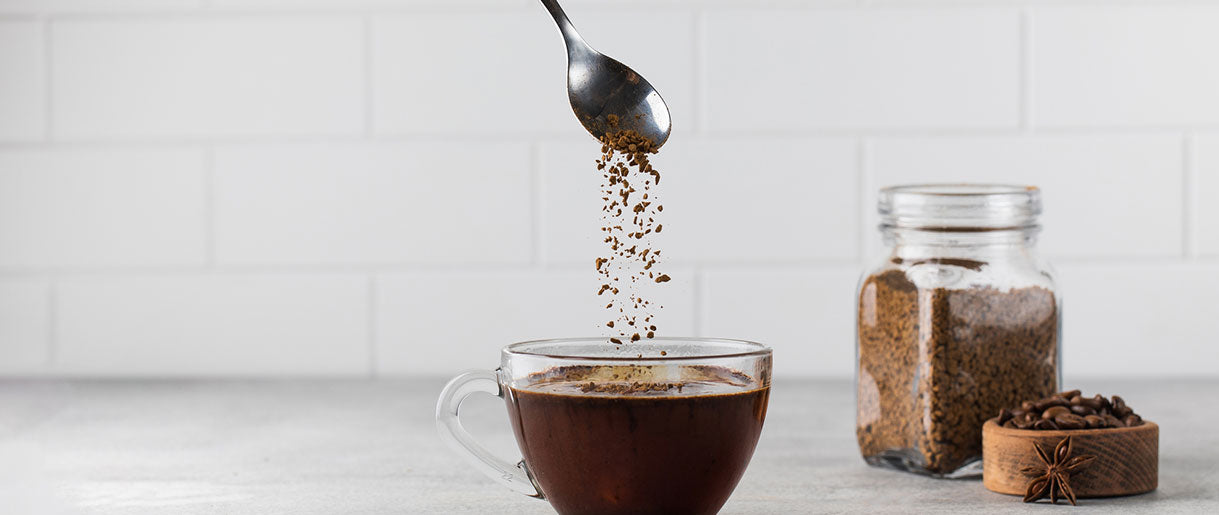
Unveiling the Origins of Your Morning Coffee
The story of regular coffee begins in the ancient coffee forests of Ethiopia. Legend has it that a herder discovered the stimulating effects of coffee after his goats ate berries from a certain tree and started to behave energetically. The discovery quickly spread to the Arabian Peninsula, where people started brewing and drinking coffee.
This led to the cultivation of Arabica coffee beans, which still make up the majority of global coffee production. With time, coffee drinking became popular around the globe, with the beverage playing a key role even in events like World War II, where it helped keep soldiers alert.
From Bean to Brew
Making regular coffee involves a multi-step process. It starts with harvesting coffee cherries and extracting the coffee beans inside. After being dried, these beans are roasted at varying levels depending on the desired flavor profile.
They are then ground up to create ground coffee beans. The final step is brewing, which can be done using different methods, from a classic drip brew to a more modern espresso machine, each contributing to a unique taste in your regular cup of coffee.
Unpacking the Health Benefits
Regular coffee is not just a trendy beverage; it's a healthful one, too. A regular cup of coffee is a significant source of antioxidants and has been associated with several potential health benefits. These include improved cognitive function, lower risk of certain types of cancer, and enhanced athletic performance. That morning coffee not only gives you more energy but also has the potential to contribute positively to your overall health.
Interesting Read: See the best morning energy drinks.
What to Consider When Enjoying Your Coffee Routine
While there are numerous benefits to a coffee routine with regular coffee, some potential drawbacks also exist. The most well-known is perhaps its caffeine content. Depending on how much you consume, it can cause side effects such as restlessness, insomnia, and a rapid heartbeat.
This is important to consider if you're wondering how much caffeine suits your diet. For some people, decaffeinated coffee might be a better option. It's also worth noting that not everyone metabolizes caffeine the same way. Some might feel more jittery or wired after drinking coffee, while others might feel just a mild buzz.
Mushroom Coffee: The Magic in Your Mug
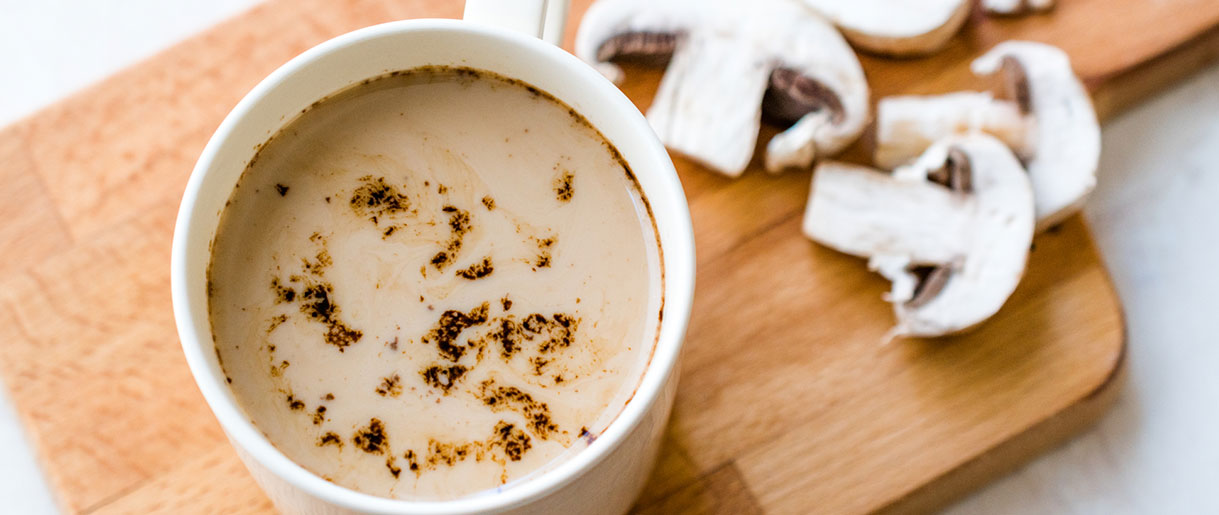
The Brew Behind Mushroom Coffee
Mushroom coffee is a rather innovative trend in health and wellness. The concept of mushroom coffee originates from the East, particularly in China and Siberia, where mushrooms have been used in traditional medicine for centuries.
Mushroom coffee blends ground coffee beans and mushroom extracts from functional mushrooms. These are not your everyday edible mushrooms but ones with purported health-promoting properties. These mushrooms often act as coffee supplements, adding more health benefits.
Crafting the Perfect Cup of Mushroom Coffee
Making coffee-mushroom blend is a unique process. First, functional mushrooms like Chaga mushrooms, Lion's mane, turkey tail, and others are harvested. They are then dried and ground into a fine mushroom powder.
This mushroom powder is combined with ground coffee beans to create the final product. The ratio for most mushroom powder and coffee blends is typically around half coffee and half mushroom extract. This mixture ensures the mushroom coffee taste isn't too overwhelming, and the final brew still has some familiar coffee notes.
Health Benefits of Mushroom Coffee: Beyond Your Typical Cup of Joe
The benefits of mushroom coffee are often linked to the medicinal mushroom extracts' unique properties. For instance, mushroom coffee with Chaga mushrooms is touted for its potential to boost the immune system and reduce inflammation. Meanwhile, Lion's mane, another popular choice for mushroom coffee, is known for its potential cognitive-enhancing effects.
A cup of mushroom coffee contains less caffeine than regular coffee, making it an excellent coffee alternative for caffeine-sensitive people. However, it's important to note that while the health benefits of mushroom coffee are often promoted, not all health claims are backed by substantial scientific research.
Considerations When Sipping on Mushroom Coffees
While mushroom coffee certainly has potential advantages, there are a few points to remember. First, the mushroom coffee taste can be a bit of a departure from traditional coffee. Some describe it as having an earthier flavor. For some, this might be an acquired taste.
Moreover, some people might have allergies or intolerances to mushroom powder, ground mushrooms, or other additives commonly found in mushroom coffees. Also, while mushroom coffee contains some beneficial compounds, the concentration of these compounds may vary from brand to brand. Thus, consuming mushrooms in coffee form may not be sufficient to experience all the potential health benefits.
Mushroom Coffee vs. Regular Coffee: The Coffee Showdown
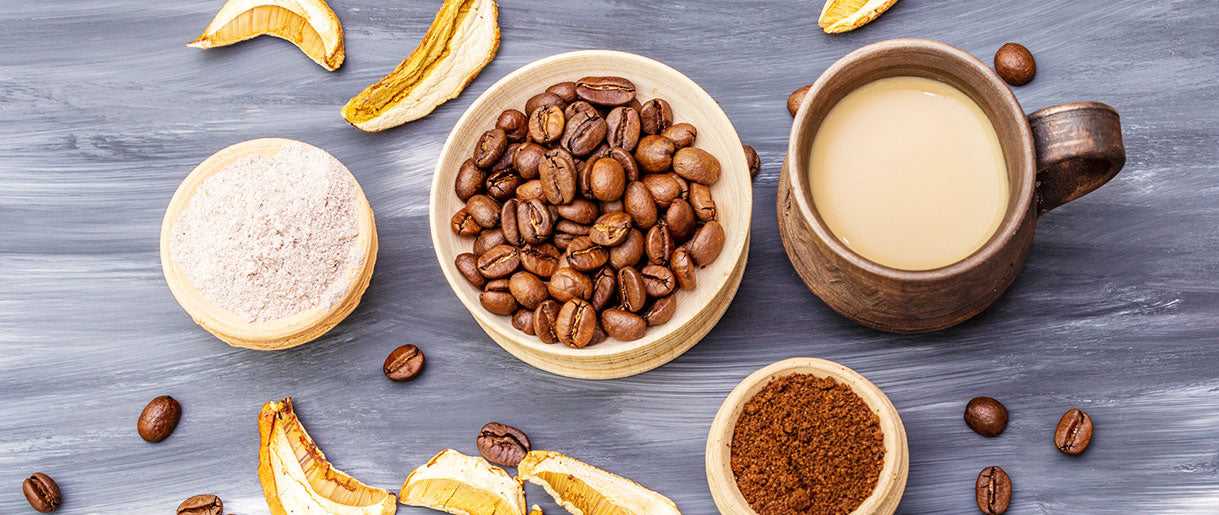
A Clash of Flavors: Earthier, But Less Bitter in Mushroom Coffee
Regarding taste in this debate, it largely boils down to personal preference. Regular coffee tends to offer a robust, bitter taste that is widely loved around the globe.
On the other hand, mushroom coffee brings an earthier flavor profile to the table. The taste of medicinal mushrooms like Reishi or Lion's Mane blends with the classic coffee taste, creating a unique blend that some find comforting.
The Nutritional Showdown: Health Claims and Benefits
Nutritionally, both regular and mushroom coffee have their unique benefits. Regular coffee is rich in antioxidants and has been linked to a reduced risk of heart disease and other health conditions.
Meanwhile, mushroom coffee touts potential health benefits derived from medicinal mushrooms. For instance, mushroom coffee may boost the immune system thanks to compounds found in mushrooms like Turkey's Tail. Reishi extracts, often present in mushroom coffee, are associated with potential health benefits such as reduced anxiety.
It's also worth noting that mushroom coffee generally contains less caffeine than regular coffee, a plus for those sensitive to caffeine or looking to reduce their intake. However, it's important to view these health claims with a discerning eye, as research into the health benefits of mushroom powder or powdered mushrooms in coffee is ongoing.
Brewing Sustainability: The Environmental Impact
Regarding environmental sustainability, factors such as farming practices, sourcing, and production methods all come into play. Cultivating medicinal mushrooms used in mushroom coffee often has fewer environmental impacts than traditional coffee farming, largely because it can be done using less land and resources. However, adding mushrooms or incorporating mushrooms into coffee in a form that maintains their beneficial properties can be resource-intensive.
Comparing Costs: Analyzing the Effect on Your Wallet
Price-wise, mushroom coffee tends to be more expensive than regular coffee. This is due to the cost of growing, harvesting, and processing adaptogenic mushrooms into a form suitable for blending with coffee. It's worth noting, though, that for some, the potential benefits of mushroom coffee may justify the higher price tag.
Personalization of Coffee Choices: One Size Does Not Fit All

The Art of Personalizing Your Brew
When deciding between mushroom coffee and regular coffee, it's essential to remember that everyone is unique. The best choice can differ greatly between individuals based on personal preferences, lifestyle, and health needs.
What makes one person feel fantastic and energized might not have the same effect on someone else. The beauty of our modern world is that we can choose and customize what we consume, and coffee is no exception.
A Cup Tailored to Your Needs: Factors to Consider
There are several key factors to consider when deciding between mushroom coffee and regular coffee. These factors include:
Taste
Your taste is, of course, paramount. If you enjoy medicinal mushrooms' earthy, slightly sweet taste, mushroom coffee might be right up your alley. On the other hand, if you're a fan of the classic robust flavor of traditional coffee, sticking with a regular brew might be your best bet.
Health Status
Health considerations also play a crucial role. Mushroom coffee is often hailed for its potential health benefits, including immune support and cognitive enhancements. However, it's important to remember that individual reactions to medicinal mushrooms vary.
Regular coffee might be the safer option if you're sensitive to certain mushrooms' effects. On the contrary, mushroom coffee's typically lower caffeine content might be appealing if you're trying to reduce your caffeine intake.
Lifestyle and Daily Routine
Your lifestyle and daily routine can also influence your decision. If you're always on the go and need a quick, accessible pick-me-up, regular coffee is widely available and easy to brew. While increasingly popular, Mushroom coffee might require more preparation effort and might be less readily available in local coffee shops.
Making a Choice: How to Embark on Your Mushroom Coffee Journey

For the Mushroom Coffee Curious: Getting Started
If you're interested in reaping the more benefits of mushroom coffee, getting started is easy but should be done mindfully. First, speak with your healthcare provider to ensure that adding medicinal mushrooms to your diet won't interfere with current medications or underlying health conditions. Remember that some people may experience food allergies or sensitivities to certain types of medicinal mushrooms.
Then, try some popular mushroom coffee brands to find one that appeals to your taste buds. Be sure to observe your body's response as you introduce this new element into your diet, noting any changes in energy, digestion, mood, or sleep patterns.
Slow and Steady: Integrating Mushroom Coffee Into Your Diet
Starting slow is a good idea if you've decided to give mushroom coffee a go. This allows your body time to adjust to the new addition. Begin by replacing one of your regular cups of coffee with a cup of mushroom coffee. Gradually increase the frequency as you become accustomed to the flavor and effects of the mushroom coffee.
Remember, preparation is key. Mushroom coffee is typically sold in powdered form, which can be mixed with hot water and other additives like milk or sweeteners, according to your preference. Experiment with other flavors like cinnamon, vanilla, or cocoa to create a more personalized and enjoyable drink.
Embracing Diversity: Alternative Ways to Enjoy Both Types of Coffee
The beauty of coffee is its versatility. If you're not ready to fully commit to mushroom coffee, consider using it to supplement your regular coffee routine. You might have regular coffee in the morning and mushroom coffee in the afternoon for a lower-caffeine pick-me-up.
Alternatively, consider trying a half-and-half blend of regular coffee and mushroom coffee for a mix of both worlds. You could also consider using mushroom coffee in your cooking or baking for a healthy twist.
FAQs About Mushroom Coffee Vs. Regular Coffee
What Are The Side Effects Of Mushroom Coffee?
Mushroom coffee is generally considered safe, with minimal and rare side effects. However, some people may experience mild side effects from mushroom supplements, especially if they consume large amounts of mushroom coffee or have a sensitivity or allergy to certain types of mushrooms. Here are some of the possible side effects of mushroom coffee:
- Digestive issues: Some people may experience digestive problems such as bloating, gas, or an upset stomach after consuming mushroom coffee.
- Allergic reactions: People allergic to certain types of mushrooms may experience allergy symptoms, including hives, itching, swelling, or difficulty breathing.
- Interaction with medications: Some medicinal mushrooms used in coffee-mushroom blends may interact with certain medications, including blood-thinning drugs and medicines for diabetes.
- Insomnia:The caffeine content in mushroom coffee may cause insomnia or restlessness in some people, especially if consumed in large amounts or in the evening.
Does Mushroom Coffee Have Caffeine?
Yes, mushroom coffee does contain caffeine. However, coffee drinks with mushrooms contain about half as much caffeine as regular coffee.
Although mushroom powders do not naturally contain caffeine, many coffee-mushroom blends include Arabica coffee beans or grounds to add flavor and caffeine content to the drink. If you do not like caffeine, you can choose decaf options or prepare your drinks with mushroom powders alone.
Is Mushroom Coffee Suitable For Everyone?
Drinking coffee with mushrooms is generally considered safe and suitable for most people. However, certain groups of people may need to exercise caution when using coffee-mushroom blends or avoid it altogether. Here are some examples:
- People with mushroom allergies: If you have a known allergy to mushrooms, it's best to avoid mushroom coffee.
- Pregnant or breastfeeding women: These women should consult with their healthcare provider before consuming mushroom coffee.
- People taking medications: People taking these medications should consult their healthcare provider before consuming mushroom coffee.
- Children: Children should consume mushroom coffee in moderation and with adult supervision.
Generally, if you have any health concerns or underlying medical conditions, it's always best to consult your healthcare provider before adding mushroom coffee to your diet.
Key Takeaways
The difference between mushroom coffee vs. regular coffee is straightforward: the former contains all the health benefits of functional mushrooms with lower caffeine content. However, the specific health benefits largely depend on the kind of mushroom powder extract in your coffee. For example, if your coffee has Lion's mane mushrooms, you will enjoy improved brain health, while mushrooms like Reishi and Chaga can boost your immunity and fight inflammation.
The fantastic news is that drinking coffee with mushrooms is not arduous. First, you can buy coffee with mushroom powder in the bag—numerous popular mushroom coffee brands exist in the market. Then, add water and sip away the magic potion. Alternatively, you can buy your favorite mushroom powder and coffee separately and then combine the two in your coffee maker.
Now, we'd love to hear from you! Have you tried mushroom coffee before? Or are you considering making the switch from regular coffee? Leave a comment below to share your experiences and thoughts on this intriguing topic. We're excited to continue this caffeinated conversation with you!




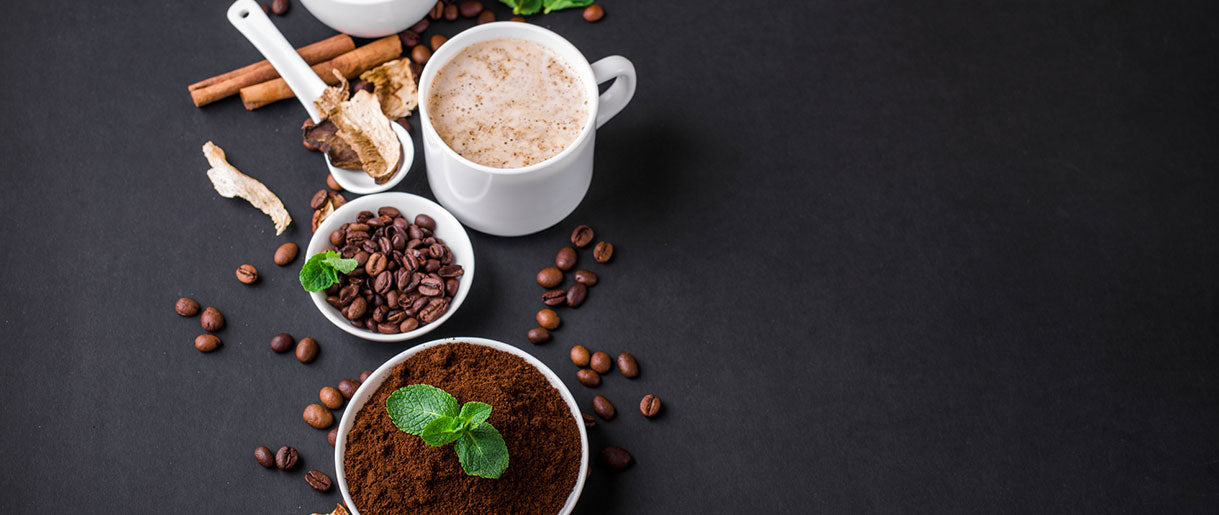




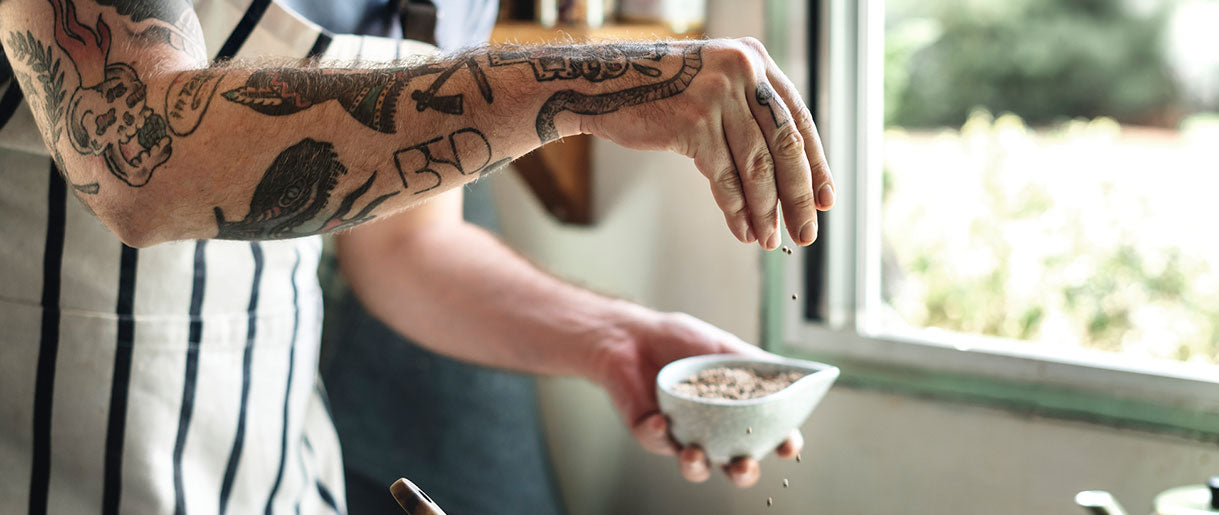
Let Us Know Your Comments